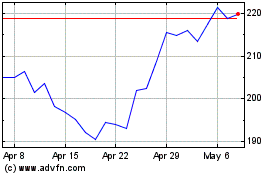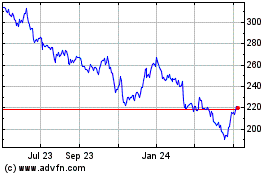Biogen, Reversing Itself, to Seek FDA OK for Alzheimer's Drug -- 2nd Update
October 22 2019 - 10:09AM
Dow Jones News
By Joseph Walker
Biogen Inc. will seek regulatory approval early next year for an
Alzheimer's disease drug, the company said, some seven months after
pulling the plug on late-stage studies of the drug.
Shares of Biogen surged more than 36% in premarket trading,
putting the company on track to add more than $16 billion in market
value. When the company and partner Eisai & Co. in March said
they would terminate the late-stage studies, Biogen lost about $18
billion in market value.
The Cambridge, Mass., biotech said Tuesday its reversal follows
an analysis of a larger dataset from the studies that showed the
drug reduced clinical decline in patients with early Alzheimer's
disease who got higher doses. The drug is called aducanumab.
If approved, Biogen's drug would be the first to slow cognitive
decline in Alzheimer's patients, a milestone in long-running but
largely futile efforts to find a medicine that can treat the
memory-robbing disease, rather than just the symptoms.
But whether regulators will clear the drug for sale, or if
insurers will pay for it, is unclear. "We expect Biogen will have
an uphill climb" convincing regulators that the positive signs it
saw in its data analysis "were anything more than random chance,"
Baird analyst Brian Skorney wrote in a note to clients.
J.P. Morgan analyst Cory Kasimov said in a note that he was
speechless aducanumab had come back from the dead. "We still have
some major questions about the data and whether or not the filing
will be ultimately approvable, but it's also hard to look past the
unmet medical need and the FDA simply saying there's a chance," Mr.
Kasimov said.
Biogen said it conducted the new analysis in consultation with
the U.S. Food and Drug Administration, and it included data that
became available after its initial look at results led to the
decision to discontinue the studies.
In March, Biogen and Eisai had determined the drug would likely
fail to help patients.
On Tuesday, Biogen CEO Michel Vounatsos told investors during a
conference call that the companies' initial determination was
incorrect.
Based on discussions with the FDA, the company said it plans to
seek approval for aducanumab in early 2020 and it would continue
talks with regulatory authorities in international markets,
including Europe and Japan.
Biogen had been in discussion with the FDA since June and in a
meeting on Monday, the company gained confidence to submit the drug
for approval, Mr. Vounatsos said in an interview. "Until yesterday,
it was still inconclusive," he said.
The new analysis is based on data collected from patients
between December 2018 and March 2019 when Biogen conducted its
futility analysis, said Samantha Budd Haeberlein, Biogen's vice
president of late stage clinical development, in an interview. The
new data showed that patients receiving higher doses of the drug
had significant reductions in clinical decline compared with
patients receiving a placebo, she said.
The reversal brings renewed hope to the hypothesis that has
informed much of the recent research and investment into potential
Alzheimer's drugs: that the buildup in the brain of a sticky
substance called Beta amyloid plays a pivotal role in the
disease.
Drugs like aducanumab have targeted the sticky tangles with the
goal of slowing or halting the progression of the disorder. But a
number of drugs developed with the idea in mind have failed.
Aducanumab was an important bet for Biogen because the biotech
company has been looking to Alzheimer's disease treatment to fuel
future revenue growth, especially as competition eats into sales of
its core franchise of drugs treating multiple sclerosis.
Many investors were also taken by the company's wager on
Alzheimer's. The massive market opportunity treating the
memory-robbing disease -- potentially worth billions of dollars a
year in sales -- as well as some promising data from early-stage
studies attracted new investors to the company and helped drive up
its share price.
Excited, too, by the potential opportunity, Biogen invested
heavily in recent years to enroll thousands of patients in
late-stage studies of aducanumab, some analysts said.
Biogen and Eisai, which had worked jointly on developing
aducanumab since October 2017, had been studying it in the early
stage of Alzheimer's. Researchers hypothesized that using the drug
early in the disease might be a more effective avenue for
amyloid-targeting therapy after previous such treatments at later
stages had failed.
Write to Joseph Walker at joseph.walker@wsj.com
(END) Dow Jones Newswires
October 22, 2019 09:54 ET (13:54 GMT)
Copyright (c) 2019 Dow Jones & Company, Inc.
Biogen (NASDAQ:BIIB)
Historical Stock Chart
From Mar 2024 to Apr 2024

Biogen (NASDAQ:BIIB)
Historical Stock Chart
From Apr 2023 to Apr 2024
